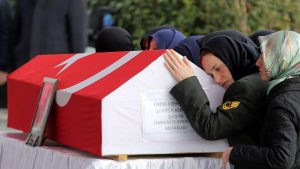Can war ever be good for public health? It’s a ludicrous question when the horrendous consequences of the long-running, many-sided Syrian conflict are plain to see on television screens and social media.
Dozens are dead as a result of Turkey’s military offensive against the Kurds in Afrin; many were killed by suspected Russian warplanes that attacked the Syrian rebel-held city of Idlib; a potato market full of farmers and traders in Saraqeb was casually bombed out of business.
No, war is emphatically not good for anyone’s physical or psychological health, not even that of the aggressor nor the eventual victor. However, in Turkey, it is apparently anti-national to make the case for peace.
On January 30, the Turkish government detained leading lights of the country’s main medical association because they were so bold as to deplore the human suffering caused by military operations such as that in Afrin. “War,” the Turkish doctors said, as well they might, “is a man-made public health problem.”
It was an understatement and a rather innocuous one at that, yet it incensed Turkish President Recep Tayyip Erdogan enough for him to brand the doctors “terrorist lovers.” Scaling the heights of doublespeak, Erdogan suggested the doctors who spoke out against war didn’t want to “say yes to peace.” As the oft-quoted Orwellian line goes: “War is peace. Freedom is slavery. Ignorance is strength.”
It is sometimes the case that the peacenik is branded a warmonger for failing to see the virtues of a violent conflict.
The Turkish medical community seems to fall in that category in a country where a militaristic nationalism is cheering on Erdogan’s bold moves against the Kurds. By refusing to hail the Afrin offensive as necessary bloodshed, as a just war to end all wars, the doctors have evoked disturbing images. They are forcing Turks to think of gore rather than national glory. By correctly describing war as a “man-made” problem rather than an inevitable consequence of the human condition, the medics have underlined the unfortunate reality of the Afrin incursion.
Simply put it is as follows: There is never a need to go to war. Peaceful resolution is always better than conflict. For all that Turkey considers the US-backed Kurdish militia, which controls much of north-eastern Syria, a terrorist group, military measures should have been the last resort.
For all that Turkey wants to prevent the Kurds from consolidating their hold on Syrian territory, the military offensive carries grave risks of escalation. It could bring Turkey’s interests into direct conflict with those of the United States if Erdogan’s forces move on to Manbij, another Kurdish-controlled Syrian town where US military personnel were visibly deployed last year.
Coincidentally, the Turkish ructions over the implications of war for public health come at a time the results are starkly apparent elsewhere. In the Central African Republic, medical charity Doctors without Borders said, the health system has practically been obliterated by the civil war.
It recently spoke of the conflict plunging to new lows. Doctors without Borders reported attacks on ambulances even as they were transporting the wounded, indiscriminate shooting inside medical facilities and everyday instances of patients being forcibly removed from their beds and executed in cold blood.
Even without such horrors, war has very definite consequences for public health and well-being.
War makes widows of women, orphans of children and refugees of whole communities. It darkens family hearths, maims, cripples and traumatises. It devastates the natural environment, poisoning soil and water and sows the land with unexploded ordnance.
There are no precise figures but more than 100 million people are said to have been killed in the many wars that raged in the 20th century. There is a constituency for peace. It is global and it exists in Turkey, too. Thank God for that.


